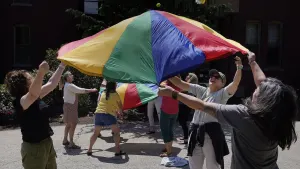More Stories
A lot of the effort to slow the spread of the coronavirus comes down to a seemingly simple concept: Wearing a mask.
But the issue has proven a thorny one. Health authorities have changed their guidance on who should wear masks and when to wear them. This has led to some confusion and even suspicion.
But since the coronavirus first appeared, authorities have gained a better understanding of how it spreads and how masks can help stop that spread.
Here's a look at how what we know about masks has changed, and how government officials are increasingly getting behind the idea of mandating the use of masks:
1. WHAT DO THE EXPERTS SAY?
The U.S. Centers for Disease Control and Prevention has long advised people to wear masks because they help prevent people who are infected - whether they know it or not - from spreading the coronavirus.
But last week, the CDC added a new reason - masks can also protect wearers who are not infected, though to a lesser degree.
So, if everyone wears a mask when social distancing is not feasible, the infection rate will be cut, experts say.
It's not a perfect solution. Hand-washing, keeping a distance and being in well-ventilated areas is important.
2. HOW IS THIS DIFFERENT FROM WHAT THEY'VE SAID BEFORE?
U.S. Surgeon General Jerome Adams tweeted on Feb. 29: “Seriously people - STOP BUYING MASKS! They are NOT effective in preventing general public from catching #Coronavirus"
But today, Adams has a different message pinned to the top of his Twitter account.
“When we can't stay six feet away from others, please, I'm begging you, wear a face covering,” Adams says in the videotaped July 2 tweet.
And in July, the CDC stressed that cloth face coverings are a critical tool in the fight against COVID-19, particularly when everyone wears them.
3. WHAT ARE THE FEDERAL REQUIREMENTS ON MASKS?
In the United States, there are none. The CDC has made only recommendations.
Some other countries have already mandated mask use, from requiring them everywhere in public to using them on public transportation and in stores.
4. HOW ARE U.S. STATES HANDLING THE SITUATION?
It's a mix. Around 36 states have some type of mask mandate.
Information compiled with reporting from The Associated Press
More from News 12
1:28

5 simple steps for long-term benefits to your health and heart
1:32

8 tips for working safely during hot weather
3:31

Guide: Ways to set your child up for financial success
3:18

Guide: The importance of good sleep and how to get it

Guide: Mental health resources available in the tri-state
9:36
